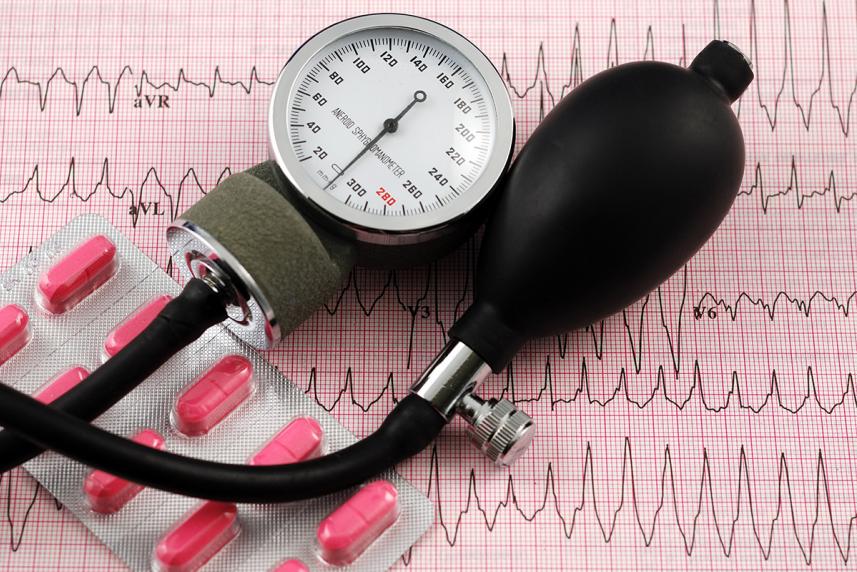
Aetna® care teams can help you find a doctor, schedule appointments, manage a condition, access the right benefits and more. It’s a personal benefit designed for Aetna Dual Eligible Special Needs Plan members.
Find out which common over-the-counter treatments can mess with your blood pressure — and learn what you can take instead

Feel a headache coming on? Stuffy nose? Heartburn? Your first thought may be to reach for a drug store pain reliever, decongestant or antacid. But if you have high blood pressure or take blood pressure medicine, those pills could put you at risk. These and other over-the-counter (OTC) products can spike blood pressure or get in the way of how your medicine works.
“People often have the perception that over-the-counter medications are completely safe and without side effects, but that’s not always the case.” So says Dave Dixon, PharmD, who leads the Department of Pharmacotherapy & Outcomes Science at the Virginia Commonwealth University School of Pharmacy. He is also on the leadership council for Prevention of Cardiovascular Disease at the American College of Cardiology.
It’s true that the U.S. Food and Drug Administration reviews OTC medicines. They look at if a drug is safe to take without a prescription. “But that doesn’t mean there’s no chance of side effects or that they won’t interact with something else you’re taking,” Dixon explains.
A normal blood pressure is less than 120/80 mm Hg. For people with normal blood pressure, using OTC drugs for short periods usually isn’t a concern. That’s according to David Alter, MD, an associate professor of medicine at the University of Toronto. But if regular testing shows your blood pressure is still high, you need to watch out for possible side effects and interactions. You also need to be careful if you’re already on a blood pressure treatment. Here’s what you should know to keep safe.

Aetna® care teams can help you find a doctor, schedule appointments, manage a condition, access the right benefits and more. It’s a personal benefit designed for Aetna Dual Eligible Special Needs Plan members.
Your blood pressure is the amount of force needed to move blood through the vessels in your body. The higher the pressure, the harder your heart has to work. The harder your heart works, the more friction that’s created. Over time, that friction can damage the lining of your blood vessels.
Seriously high blood pressure (think 180/120) can cause symptoms like a headache or nosebleed. But in most cases, there are no signs of high blood pressure. “It’s known as the silent killer,” Dixon says. “When it’s uncontrolled over time, it’s the leading cause of heart disease.”
In fact, the condition increases your risk of stroke, heart failure, kidney disease, eye problems and more, adds Dr. Alter. He’s also a senior scientist at the Cardiovascular Research Program at the Institute of Clinical Evaluative Sciences in Canada.
“High blood pressure is a complicated disorder,” Dr. Alter says. “Your kidneys, adrenal glands, brain and heart can all play a role.” Because of that, the average number of medications needed to control it is between three and four, he says. And if you stop taking any abruptly or do not take them consistently, your blood pressure may shoot up. It can be sudden or take a few days or weeks, and you might not know until it’s too late.
“I’ve seen horrific complications when people stop taking their medications,” Dr. Alter says. “But if you do forget, don’t panic. Take it as prescribed the next day rather than doubling up.”
There are several things that can go wrong with different products. For example, some OTC medicines change fluid levels in the body. That may change the amount of pressure required to move your blood. Other products cause problems with how your system absorbs or metabolizes prescription medicines, Dr. Alter says.
“If there’s any advice I give, it’s to keep a detailed list of everything you take, regardless of where you get it, and share that list with your doctor,” Dixon says.
In the meantime, here are some over-the-counter medications and supplements that may impact blood pressure. In some cases, you might get the okay from your doctor to take one or more for a brief period. In other cases, your doctor might warn you against them and offer another option.
NSAIDs may cause you to retain water, which means your heart has to work harder to pump the increased volume. They can also stop your vessels from expanding properly. When the vessels are narrow, blood can’t flow as easily. Research now shows that even acetaminophen can have similar outcomes.*
Alternative: “Topical diclofenac is an NSAID that’s generally not going to affect BP,” says Dixon.
Many of these contain NSAIDs to ease the aches that come with a cold, flu or sinus pain. They also often contain ingredients that dry up mucus and squeeze blood vessels, which can raise blood pressure, Dr. Alter says.
Alternative: Saline sprays loosen mucus to soothe stuffiness. “Hot tea and warm showers or a warm compress can also give you relief,” Dixon says. For seasonal allergies, he suggests short-term use of a nasal corticosteroid (steroid) spray.
“They tend to be high in sodium, which causes you to retain water,” Dixon says. “The resulting extra fluid can push blood pressure up.”
Alternative: Changing your diet may help ease symptoms of reflux. Fried foods, pizza and fatty meats such as bacon all can contribute to heartburn. Better options are oatmeal, bananas and water-rich produce like cucumbers and watermelon. These can help reduce stomach acid and heartburn. You can also talk to your doctor about drugs known as proton-pump inhibitors (PPI) or H2-blockers, Dixon says.
They can contain caffeine or other stimulants, which can raise blood pressure to dangerous levels, Dixon says.
Alternative: Talk to your care team for a holistic (and more effective) plan to lose weight or address issues you’d turn to supplements for.
Besides OTC products, it’s also important to be careful with alcohol, recreational drugs, energy drinks, coffee and other sources of caffeine. These all can raise blood pressure, Dr. Alter says. Not getting enough sleep is another simple thing that raises blood pressure.
Things that can help control blood pressure include eating foods that are high in fiber and low in sodium and getting regular exercise.
Alternative: Adopt healthy habits that help control blood pressure. Drink decaffeinated tea or coffee. (Check for possible caffeine, even if the label says “decaf.”) Choose foods high in fiber and low in sodium. For instance, whole grains and leafy greens. And get regular exercise and at least seven hours of sleep every night.
Need help or have a question about medicines or a health issue? Want to work toward getting off blood pressure medicines? Lean on your care team to devise a safe plan. “The body is dynamic — it can change,” says Dr. Alter.
If you qualify for both Medicare and Medicaid, you may be eligible for an Aetna® Dual Eligible Special Needs Plan (D-SNP).
If you're 65 or older and have [diabetes or an eligible heart disease an eligible chronic condition, you may qualify for an Aetna® Chronic Condition Special Needs Plan (C-SNP). Click here to find out if an Aetna C-SNP is available in your area.
You may be eligible for an Institutional Special Needs Plan if you’ve lived (or plan to live) in a qualifying facility for 90+ days and you have Medicare Part A (hospital insurance) and Part B (medical insurance).
*FOR RESEARCH ON THE RISKS OF ACETAMINOPHEN: MacIntyre IM, Turtle EJ, et al. Regular acetaminophen use and blood pressure in people with hypertension: The PATH-BP Trial. Circulation. 2022; 145:416-423. Accessed July 28, 2025.
Aetna Medicare is a HMO, PPO plan with a Medicare contract. Our DSNPs also have contracts with State Medicaid programs. Enrollment in our plans depends on contract renewal. See Evidence of Coverage for a complete description of plan benefits, exclusions, limitations and conditions of coverage. Plan features and availability may vary by service area. This material is for informational purposes only and is not medical advice. Health information programs provide general health information and are not a substitute for diagnosis or treatment by a physician or other health care professional. Contact a health care professional with any questions or concerns about specific health care needs. Providers are independent contractors and are not agents of Aetna.
Provider participation may change without notice. Aetna is not a provider of health care services and, therefore, cannot guarantee any results or outcomes. The availability of any particular provider cannot be guaranteed and is subject to change. Information is believed to be accurate as of the production date; however, it is subject to change. For more information about Aetna plans, refer to our website.
To send a complaint to Aetna, call the Plan or the number on your member ID card. To send a complaint to Medicare, call 1-800-MEDICARE (TTY users should call 1-877-486-2048), 24 hours a day/7 days a week. If your complaint involves a broker or agent, be sure to include the name of the person when filing your grievance.
The benefits mentioned are part of special supplemental program for the chronically ill. Eligibility is determined by whether you have a chronic condition associated with this benefit. Standards may vary for each benefit. Conditions include Hypertension, Hyperlipidemia, Diabetes, Cardiovascular Disorders, Cancer. Other eligible conditions may apply. Contact us to confirm your eligibility for these benefits.
Participating health care providers are independent contractors and are neither agents nor employees of Aetna. The availability of any particular provider cannot be guaranteed, and provider network composition is subject to change.
The formulary and/or pharmacy network may change at any time. You will receive notice when necessary.
This is an article available on a public website, therefore there is a possibility that this article could be viewed by consumers whose benefits are SSBCI or VBID. With that, we have included both the VBID disclaimer and SSBCI disclaimer.
Nondiscrimination Notice | CA-Specific Nondiscrimination Notice
©2025 Aetna Inc.
Y0001_5807927_2026_M
6113504-09-01
Call us at 1-844-514-8290 (TTY: 711) between 8 AM and 8 PM, Monday to Friday. Or visit AetnaMedicare.com/YourDSNP anytime.